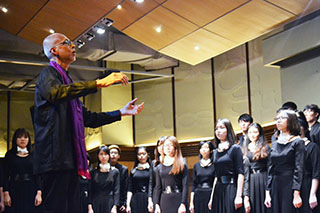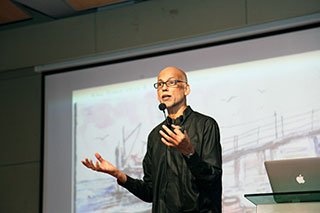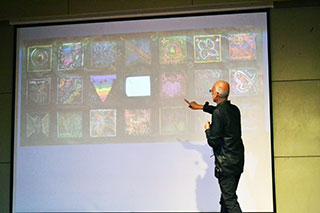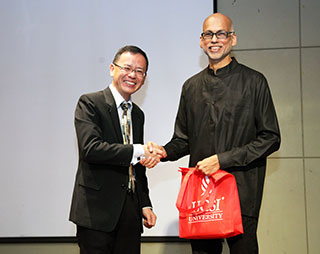UCSI explores the music of being human with Boston professor
April 19, 2017 | Campus News
KUALA LUMPUR: Professor Dr André de Quadros has spent a substantial amount of time in prison. Not as an inmate, but as a music educator for prison ministry programmes in Bangkok, Sweden, and the United States.
Speaking at UCSI University’s Institute of Music as a visiting professor from Boston University, he cited Article 27 of the Universal Declaration of Human Rights. “Everyone as the right to freely participate in cultural life and to enjoy the benefit of the arts,” he quoted. “Are your rights forfeited if you are incarcerated?”
Prof de Quadros started his prison ministry back in 2006 and has since then developed with his colleagues an approach they call Empowering Song – a teaching method rooted in improvised song, poetry, body work, and imagery.
“We are not allowed to bring any musical instruments into the prisons with us so we are working with the body,” he said. “The focus becomes, how do we make music with access to nothing? But human beings are hardwired to create, it’s in our DNA, so we just have to tap into that.”
Sensitive to vanishing culture and traditions, the professor of music and chair often seeks out songs of the old that are on the verge of being forgotten. In them, he guides his students to breathe new life and to use them as inspiration to create new art.

Most of the inmates he had spent time with were musically illiterate but from resistant teenagers to the reserved elderly, Prof de Quadros had managed to coax them all into actively participating in the creative process.
One of his students was Greg, a 50-year-old man who was sentenced to life when he was a teenager. In 2012, Greg’s case came up for resentencing and during his hearing he credited music for changing his life. Greg was released last year and since then, has accompanied Prof de Quadros to speak at presentations and to share his personal journey with music.
“Music has immense power,” said Prof de Quadros. “It is reconnecting inmates to their self-worth, recovering in them a sense of humanity, and transforming their lives in ways that they have never imagined.”
An ardent human rights and social change activist, Prof de Quadros believes that consensus music-making can bring people and cultures together. To that end, he has been at the forefront of efforts for music and social change. In 2008, during the Iraq war, he co-created a choral festival in Jordan that brought together choirs from Iraq, Jordan, Lebanon, Palestine, and Syria.
Last year, he helped to bring together equal groups of Arabs, Israelis, and Swedes – flying the Middle Easterners to Stockholm – to form an international project choir. Common Ground Voices gave its first performance in the presence of the King and Queen of Sweden and an invited audience.
Prof de Quadros doesn’t think of himself as a man with a personal mission but rather, as a path. “I’m always listening to what the locals want to do,” he said. “I have ideas but I don’t go with a plan because it’s not about me, it’s about what the people need and want. They are my partner and I am theirs.”

During his week at UCSI, Prof de Quadros participated in a lively dialogue and conducted over 10 hours of coaching sessions for all four of UCSI’s choirs – chamber, concert, mixed and junior. He came away speaking highly of the students he taught.
“UCSI has very fine students here,” he said. “They’re intelligent, responsive, and above all I find particularly terrific is that they’re eager. They have many ideas and thoughts, and they demonstrated particularly good skill levels. I was really impressed.”
As someone who has been in this discipline for a better part of his life, Prof de Quadros is well aware that in this ever-changing society, music education is constantly shifting and evolving.
“The world of music, technology, the brain and the body, the relationship between music and society, the role of culture, how music is developed in schools and in communities – they are all changing so dramatically,” he said. “Institutions must be responsive and UCSI is very much so.
“The teaching staff I’ve met here are very engaging and very committed to their mission, and Professor P’ng is a fine leader who really understands what needs to be done for a music institution. Everything that I’ve seen here has all the ingredients for long-term success.”
Prof de Quadros’s week at UCSI concluded with a concert where he conducted UCSI’s chamber and concert choirs. Before taking the stage with the students, Prof de Quadros spent some time guiding the students to approach their musical ideas from alternative perspectives.

The interaction and fresh insights are certainly one of the many advantages to having visiting musicians, according to Professor Dr P’ng Tean Hwa, Director of the Institute of Music.
“Students will get to work with someone of a world-class calibre and under a different atmosphere, but they will also be hearing a lot of same things that we have been telling them,” he said. “This reinforces that learning even as they explore different angles with the guest.”
“It was a fantastic experience,” said Shaun Chow, section leader of the chamber choir, of his time with Prof de Quadros. “I learned plenty of culture, language, and how an experienced maestro perceives music and shapes it for the public accordingly.”
Jessica Teh, president of UCSI's concert choir, added, "You get the opportunity to hear all about their experiences and in that moment when they share their life with you, you are standing on the shoulders of giants and seeing beyond what you usually see, and that expands your view as a musician and a person.”
Prof de Quadros left UCSI with a call to action. “Ask yourselves what you can do as a musician and as global citizen,” he encouraged the students. “Education prepares you to create a better place so what kind of world do you want to live in? What is music in that world and where does everyone fit in? How can you harness your strengths to realise it?”
Working with leading artists is an essential part of music education at UCSI. The Institute of Music hosts an average of 40 events a year featuring acclaimed musicians and seasoned academics whose visits serve to enhance learning outcomes.
View Other categories: NATIONAL | CAMPUS | ACHIEVEMENT | EDITOR'S DESK























